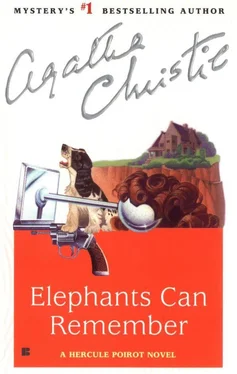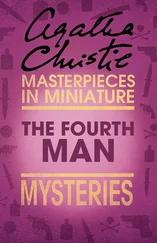Agatha Christie - Elephants Can Remember
Здесь есть возможность читать онлайн «Agatha Christie - Elephants Can Remember» весь текст электронной книги совершенно бесплатно (целиком полную версию без сокращений). В некоторых случаях можно слушать аудио, скачать через торрент в формате fb2 и присутствует краткое содержание. Год выпуска: 2004, ISBN: 2004, Издательство: Berkley, Жанр: Классический детектив, на английском языке. Описание произведения, (предисловие) а так же отзывы посетителей доступны на портале библиотеки ЛибКат.
- Название:Elephants Can Remember
- Автор:
- Издательство:Berkley
- Жанр:
- Год:2004
- ISBN:ISBN-13: 978-0425067826
- Рейтинг книги:3 / 5. Голосов: 1
-
Избранное:Добавить в избранное
- Отзывы:
-
Ваша оценка:
- 60
- 1
- 2
- 3
- 4
- 5
Elephants Can Remember: краткое содержание, описание и аннотация
Предлагаем к чтению аннотацию, описание, краткое содержание или предисловие (зависит от того, что написал сам автор книги «Elephants Can Remember»). Если вы не нашли необходимую информацию о книге — напишите в комментариях, мы постараемся отыскать её.
Elephants Can Remember — читать онлайн бесплатно полную книгу (весь текст) целиком
Ниже представлен текст книги, разбитый по страницам. Система сохранения места последней прочитанной страницы, позволяет с удобством читать онлайн бесплатно книгу «Elephants Can Remember», без необходимости каждый раз заново искать на чём Вы остановились. Поставьте закладку, и сможете в любой момент перейти на страницу, на которой закончили чтение.
Интервал:
Закладка:
"And was she innocent?"
"Yes," said Poirot. "She was innocent."
"And that surprised you?"
"Not by the time I realized it," said Poirot. "There were one or two things-one thing in particular-that showed she could not have been guilty. One fact that nobody had appreciated at the time. Knowing that, one had only to look at what there was, shall we say, on the menu in the way of looking elsewhere." Grilled trout was put in front of them at this point.
"There was another case, too, where you looked into the past, not quite in the same way," continued Spence. "A girl who said at a party that she had once seen a murder committed, "if "There again one had to-how shall I put it?-step backward instead of forward," said Poirot. "Yes, that is very true."
"And had the girl seen the murder committed?"
"No," said Poirot, "because it was the wrong girl. This trout is delicious," he added with appreciation.
"They do all fish dishes very well here," said Superintendent Spence.
He helped himself from the sauce boat proffered to him.
"A most delicious sauce," he added.
Silent appreciation of food filled the next three minutes.
"When Spence came along to me," said Superintendent Garroway, "asking if I remembered anything about the Ravenscroft case, I was intrigued and delighted at once."
"You haven't forgotten all about it?"
"Not the Ravenscroft case. It wasn't an easy case to forget about."
"You agree," said Poirot, "that there were discrepancies about it? Lack of proof, alternative solutions?"
"No," said Garroway, "nothing of that kind. All the evidence recorded the visible facts. Deaths of which there were several former examples, yes, all plain sailing. And yet-"
"Well?" said Poirot.
"And yet it was all wrong," said Garroway.
"Ah," said Spence.
He looked interested.
"That's what you felt once, isn't it?" said Poirot, turning to him.
"In the case of Mrs. McGinty. Yes."
"You weren't satisfied," said Poirot, "when that extremely difficult young man was arrested. He had every reason for doing it, he looked as though he had done it, everyone thought he had done it. But you knew he hadn't done it. You were so sure of it that you came to me and told me to go along to see what I could find out."
"See if you could help-and you did help, didn't you?" said Spence.
Poirot sighed.
"Fortunately, yes. But what a tiresome young man he was.
If ever a young man deserved to be hung, not because he had done a murder but because he wouldn't help anyone to prove fhat he hadn't. Now we have the Ravenscroft case. You say, Superintendent Garroway, something was wrong?"
"Yes, I felt quite sure of it if you understand what I mean."
"I do understand," said Poirot. "And so does Spence. One does come across these things sometimes. The proofs are there, the motive, the opportunity, the clues, the mise en scene, it's all there. A complete blueprint, as you might say.
But all the same, those whose profession it is, know. They know that it's all wrong, just like a critic in the artistic world knows when a picture is all wrong. Knows when it's a fake and not the real thing."
"There wasn't anything I could do about it, either," said Superintendent Garroway. "I looked into it, around it, up above it and down below it, as you might say. I talked to the people. There was nothing there. It looked like a suicide pact, it had all the marks of the suicide pact. Alternatively, of course, it could be a husband who shot a wife and then himself, or a wife who shot her husband and then herself. All those three things happen. When one comes across them, one knows they have happened. But in most cases one has some idea of why."
"There wasn't any real idea of why in this case, was that it?" said Poirot.
"Yes. That's it. You see, the moment you begin to inquire into a case, to inquire about people and things, you get a very good picture as a rule of what their lives have been like. This was a couple, aging, the husband with a good record, a wife affectionate, pleasant, on good terms together. That's a thing one soon finds out about. They were happy living together.
They went for walks, they played picquet, and poker patience with each other in the evenings. They had children who caused them no particular anxiety. A boy in school in England and a girl in a pensionnat in Switzerland. There was nothing wrong with their lives as far as one could tell. From such medical evidence as one could obtain, there was nothing definitely wrong with their health. The husband had suffered from high blood pressure at one time, but was in good condition by the taking of suitable medicaments which kept him on an even keel. His wife was slightly deaf and had had a little minor heart trouble, nothing to be worried about. Of course it could be, as does happen sometimes, that one or other of them had fears for their health. There are a lot of people who are in good health but are quite convinced they have cancer, are quite sure that they won't live another year. Sometimes that leads to their taking their own life. The Ravenscrofts didn't seem that kind of people. They seemed well balanced and placid."
"So what did you really think?" said Poirot.
"The trouble is that I couldn't think. Looking back, I say to myself it was suicide. It could only have been suicide. For some reason or other they decided that life was unbearable to them. Not through financial trouble, not through health difficulties, not because of unhappiness. And there, you see, I came to a full stop. It had all the marks of suicide. I cannot see any other thing that could have happened except suicide.
They went for a walk. On that walk they took a revolver with them. The revolver lay between the two bodies. There were blurred fingerprints of both of them. Both of them in fact had handled it, but there was nothing to show who had fired it last. One tends to think the husband perhaps shot his wife and then himself. That is only because it seems more likely.
Well, why? A great many years have passed. When something reminds me now and again, something I read in the papers of bodies, a husband and wife's bodies somewhere, lying dead, having taken their own lives apparently, I think back and then I wonder again what happened in the Ravenscroft case.
Twelve years ago or fourteen and I still remember the Ravenscroft case and wonder-well, just the one word, I think. Why-why-why? Did the husband really hate his wife, and had hated her for a long time? Did the wife really hate her husband and want to get rid of him? Did they go on hating each other until they could bear it no longer?" Garroway broke off another piece of bread and chewed at it.
"You got some idea. Monsieur Poirot? Has somebody come to you and told you something that has awakened your interest particularly? Do you know something that might explain the 'Why'?"
"No. All the same," said Poirot, "you must have had a theory. Come now, you had a theory?"
"You're quite right, of course. One does have theories. One expects them all, or one of them at least, to work out, but they don't usually. I think that my theory was in the end that you couldn't look for the cause, because one didn't know enough.
What did I know about them? General Ravenscroft was close on sixty; his wife was thirty-five. All I knew of them, strictly speaking, was the last five or six years of their lives. The General had retired on a pension. They had come back to England from abroad and all the evidence that came to me, all the knowledge, was of a brief period during which they had first a house at Bournemouth and then moved to where they lived in the home where the tragedy took place. They had lived there peacefully, happily, their children came home there for school holidays. It was a peaceful period, I should say, at the end of what one presumed as a peaceful life. But then I thought, but how much did I know of that peaceful life? I knew of their life after retirement in England, of their family. There was no financial motive, no motive of hatred, no motive of sexual involvement, of intrusive love affairs. No.
Читать дальшеИнтервал:
Закладка:
Похожие книги на «Elephants Can Remember»
Представляем Вашему вниманию похожие книги на «Elephants Can Remember» списком для выбора. Мы отобрали схожую по названию и смыслу литературу в надежде предоставить читателям больше вариантов отыскать новые, интересные, ещё непрочитанные произведения.
Обсуждение, отзывы о книге «Elephants Can Remember» и просто собственные мнения читателей. Оставьте ваши комментарии, напишите, что Вы думаете о произведении, его смысле или главных героях. Укажите что конкретно понравилось, а что нет, и почему Вы так считаете.












